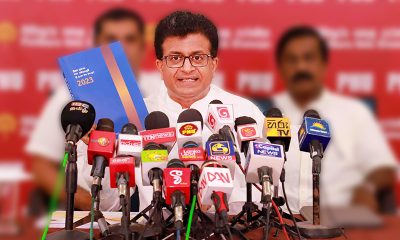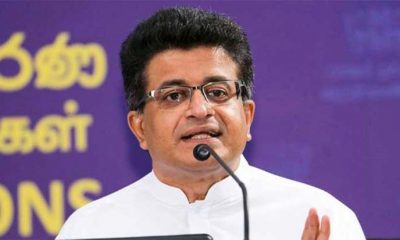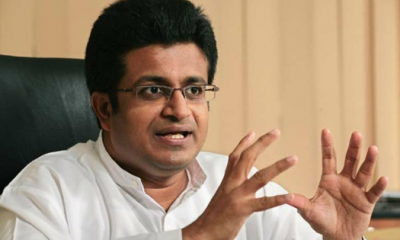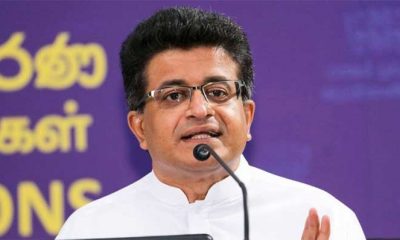News
Govt. decision to give two million farming families freehold land deeds will lead to shanty towns – Udaya
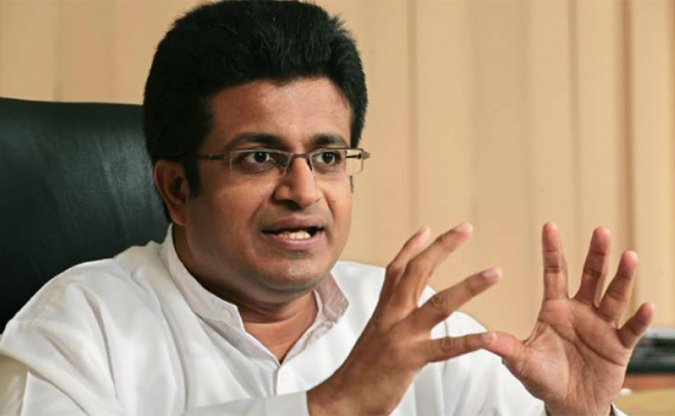
By Saman Indrajith
The government’s decision to give two million farming families freehold land deeds will lead to shanty towns popping up in most major towns in Sri Lanka, Pivithuru Hela Urumaya (PHU) leader Udaya Gammanpila said.
Gammanpila added that President Ranil Wickremesinghe’s Urumaya Freehold Deed Programme could probably mark the end of Sri Lankan smallholder farming.
Gammanpila said that farmers only mad money during crop harvesting periods, i.e., at most three times a year.
“A typical farmer borrows money to cover daily expenses. Then he pays these loans with the money he makes during the harvest. Sometimes, he suffers crop losses due to natural disasters, diseases and insects. Sometimes, the farmers commit suicide, but because they do not have freehold titles, the land remains in the family,” he said.
Gammanpila said that since Independence, successive governments have given farmers deeds that are not transferable or sellable. None of these governments have freehold deeds because it was understood that farmers were in a debt trap.
“These days, farmers are facing greater economic challenges than ever. If we give them freehold land, within two years, a significant number of farming families will sell their lands. We will have so many landless people.”
The PHU leader said that most farmers are indebted to loan sharks. This is mainly the fault of banks, which are hesitant to give loans to farmers. Most bank loan schemes are aimed at monthly wage earners.
“The government recently decided that it will not purchase paddy this year. It will, however, give nine billion rupees to small and medium-scale rice millers so that they can buy paddy from farmers. If the government can come up with new schemes to support millers, it should also do something for farmers.”
About 35 percent of the workforce is in the informal sector, and the government and banks must come up with creative schemes to cater to their needs, too, he said.
“Now, the loan sharks can’t ask the farmers to keep their deeds as collateral. With freehold titles, loan sharks can ask farmers to do so, and the moment something goes wrong, these unscrupulous businessmen will take over farmers’ lands. What will the farmers do? Because of their pride, most people will come into the main towns with their families, instead of becoming a labourer. They will set up a shed, and we will soon have colonies of shanties.”
Gammanpila said that such shanty towns can be seen across South Asia. We escaped that because Presidents Ranasinghe Premadasa and Mahinda Rajapaksa pumped money into rural infrastructure. Despite the many shortcomings of the initiatives of these men, most Sri Lankan villages have schools, a road network and basic infrastructure that prevented an exodus of villagers into towns.
“These shanty towns become dens of inequity. There will be diseases and crime. Unplanned urbanization will lead to a plethora of socio-economic problems. Just look at India, Bangladesh, Nepal, Indonesia, etc.”
Gammanpila said the government needs to introduce farming insurance, and state banks should come up with deposit and lending schemes for farmers. Even if we had such schemes, this is the worst time to expose farmland to market mechanisms, he said.
“The price of locally manufactured goods have doubled in the last 18 months. Price of imports has tripled. Most people are selling their assets to make ends meet. At this point, we are giving farmers another item they can sell or pawn. Why are people taking loans now? It’s to bridge the gap between income and expenses. They are not borrowing to invest. There is no way that people can pay these loans. This is the reality.”
The PHU MP said he has no problem introducing a freehold deed scheme once the economy has recovered and bank loans and insurance schemes for farmers have been established.
“Even now, there is nothing preventing farmers from joining hands with others to start collectives, establish businesses or lease the land to another farmer in the same category. There are people who have established farmer’s cooperatives. We also have other state lands that can be released for large-scale commercial agriculture.”
News
US sports envoys to Lanka to champion youth development

The U.S. Embassy in Colombo welcomed the U.S. Sports Envoys to Sri Lanka, former National Basketball Association (NBA) and Women’s National Basketball Association (WNBA) players Stephen Howard and Astou Ndiaye, from June 8 through 14.
The Public Diplomacy section of the U.S. Embassy said that it would launch a weeklong basketball program intended to harness the unifying power of sports, made possible through collaboration with Foundation of Goodness and IImpact Hoop Lab.
While in Sri Lanka, Howard and Ndiaye, both retired professional basketball players, will conduct a weeklong program, Hoops for Hope: Bridging Borders through Basketball. The Sports Envoys will lead basketball clinics and exhibition matches and engage in leadership sessions in Colombo and Southern Province for youth aged 14-18 from Northern, Uva, Eastern and Western Provinces, offering skills and leadership training both on and off the court. The U.S. Envoys will also share their expertise with the Sri Lanka Basketball Federation, national coaches, and players, furthering the development of basketball in the country. Beyond the clinics, they will collaborate with Sri Lankan schoolchildren to take part in a community service project in the Colombo area.
“We are so proud to welcome Stephen and Astou as our Sports Envoys to Sri Lanka, to build on the strong people-to-people connections between the United States and Sri Lanka,” said U.S. Ambassador Julie Chung. “The lessons that will be shared by our Sports Envoys – communication, teamwork, resilience, inclusion, and conflict resolution – are essential for leadership development, community building, equality, and peace. The U.S. Sports Envoy program is a testament to our belief that sports can be a powerful tool in promoting peace and unity.”
News
Rahuman questions sudden cancellation of leave of CEB employees

SJB Colombo District MP Mujibur Rahuman in parliament demanded to know from the government the reasons for CEB suspending the leave of all its employees until further notice from Thursday.
MP Rahuman said that the CEB has got an acting General Manager anew and the latter yesterday morning issued a circular suspending leave of all CEB employees with immediate effect until further notice.
“We demand that Minister Kanchana Wijesekera should explain this to the House. This circular was issued while this debate on the new Electricity Amendment Bill was pending. There are many who oppose this Bill. The Minister must tell parliament the reason for the urge to cancel the leave of CEB employees,” the MP said.However, Speaker Mahinda Yapa Abeywardena prevented Minister Wijesekera responding to the query and said that the matter raised by MP Rahuman was not relevant.
News
CIPM successfully concludes 8th Annual Symposium

The Chartered Institute of Personnel Management (CIPM) successfully concluded the 8th Annual CIPM Symposium, which took place on 31st May 2024. Themed “Nurturing the Human Element—Redefining HRM in a Rapidly Changing World,” the symposium underscored the pivotal role of human resource management (HRM) in today’s dynamic global landscape. Since its inception in 1959, CIPM has been dedicated to advancing the HR profession through education, professional development, and advocacy, solidifying its position as Sri Lanka’s leading professional body for HRM.
Ken Vijayakumar, the President of the CIPM, graced the occasion as the chief guest. The symposium commenced with the welcome address by the Chairperson, Prof. Arosha Adikaram, followed by the Web Launch of the Symposium Proceedings and Abstract Book by the CIPM President. The event featured distinguished addresses, including a speech by Chief Guest Ken Vijayakumar, President of CIPM, and an address by Guest of Honor Shakthi Ranatunga, Chief Operating Officer of MAS Holdings Pvt. Ltd., Sri Lanka.
The symposium also featured an inspiring keynote address by Prof. Mario Fernando, Professor of Management and Director of the Centre for Cross Cultural Management (CCCM) at the University of Wollongong, Australia.
Vote of Thanks of the inauguration session was delivered by Dr. Dillanjani Weeratunga, Symposium Co-chair.
The symposium served as a comprehensive platform for researchers to present their findings across a wide range of critical topics in HRM. These included Cultural Diversity and Inclusion, Talent Development and Retention, Ethical Leadership and Corporate Social Responsibility, Adapting to Technological Advancements, Mental Health and Well-being at Work, Global Workforce Challenges, Employee Empowerment, and Reskilling and Upskilling.
The plenary session was led by Prof. Wasantha Rajapakse. Certificates were awarded to the best paper presenters during the valedictory session, followed by a vote of thanks delivered by Kamani Perera, Manager of Research and Development.
The annual symposium of CIPM was a truly inclusive event, attracting a diverse audience that spanned undergraduates, graduates, working professionals, research scholars and lecturers. This widespread interest highlights the symposium’s significance in the field of HRM, offering a unique opportunity for everyone to network and learn from scholarly brains.The CIPM International Research Symposium was sponsored by Hambantota International Port, Sri Lanka Institute of Information Technology (SLIIT), E B Creasy & Co. PLC, and Print Xcel Company.


